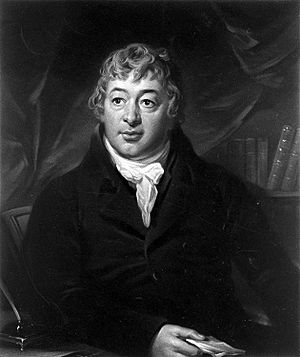John Hull (physician) facts for kids
John Hull (1761–1843) was a very important doctor in Manchester a long time ago, during the late 1700s and early 1800s. He was especially known for helping women give birth, a field called obstetrics. John Hull was a key part of the medical world in Manchester and often joined in important discussions about health.
Contents
Becoming a Doctor
John Hull was born in 1761 in a place called Poulton, Lancashire. His father was also involved in medicine, working as an apothecary (someone who prepared and sold medicines) and a surgeon. Sadly, John became an orphan when he was quite young.
When he was 16, John started learning medicine as an apprentice to Mr. Lancaster in Blackburn. Mr. Lancaster was a surgeon and also helped women during childbirth. This is where John first started helping with "lying-in cases," which means helping women give birth. This work later became the most important part of his career.
After his training, John went to London. In 1784, he passed his exams with the Corporation of Surgeons. He also studied medicine at St Thomas’ Hospital in London for at least a year. He learned from famous doctors like George Fordyce and Henry Cline.
After becoming a qualified doctor in 1784, he went back to Blackburn. He worked with his old teacher, Mr. Lancaster, and eventually bought the medical practice. In 1791, he got married. John then decided to study even more. He went to Leiden in the Netherlands and earned his MD degree in 1792.
Working in Manchester
After finishing his studies, John Hull continued to work in Blackburn for a while. But in 1796, he moved to Manchester. He wanted to focus more on obstetrics, and Blackburn didn't have a special hospital for childbirth.
In Manchester, John became a highly respected obstetrician. He often took part in important discussions about medical practices. He strongly believed that sometimes a surgery called a caesarean section was necessary and helpful for mothers and babies.
The staff at the Lying-in Hospital (now St Mary’s Hospital) supported his views. However, some doctors at the Manchester Royal Infirmary, especially William Simmons, disagreed. Simmons even wrote a paper criticizing the operation. John Hull wrote a response, and their debate went on for several years.
In 1804, John Hull joined the staff of the Manchester Lying-in Hospital. He also became part of its medical committee. The next year, in 1805, he was given the important job of senior physician at the hospital. He held this position until he retired in 1837.
He also worked with other medical places in Manchester. He was a consulting physician at the Institution for Curing Diseases of the Eye, which is now the Manchester Royal Eye Hospital. In 1819, he also helped start the Manchester and Salford Lock Hospital. This hospital helped women who were in difficult situations.
Medical Societies and Interests
John Hull was a member of important medical groups. In 1806, he became an Extra-Licentiate of the Royal College of Physicians, and then a Licentiate in 1819.
He was also very active in local groups, like the Manchester Literary and Philosophical Society. This was a key place where doctors and other medical professionals in Manchester could meet and talk about their work. The debates about the caesarean section often happened here. John Hull was a co-secretary for many years and became president in 1809. However, he soon stepped down for Thomas Henry, one of the society's founders.
Years later, there was a need for a special medical society just for doctors. John Hull led the effort to create the Manchester Medical Society in 1834. He was its first president from 1834 to 1838. When the society started, he gave them many books to help build a large library.
Besides medicine, John Hull was also very interested in botany, which is the study of plants. He was well-known for this hobby. He was also a member of the Linnaean Society, a famous group for naturalists.
Later Life and Family
John Hull passed away on March 17, 1843, in London. He was at the home of his oldest son, William Winstanley Hull (1794-1873). His son became a well-known writer of religious songs and texts.
John Hull was also the grandfather-in-law of the writer Edith Maud Hull (1880-1947). And he was the great-grandfather of another writer, Cecil Winstanley Hull (who died in 1980).
His Important Books
John Hull wrote several important books and papers during his career. Some of his main works include:
- 'A Remarkable Case of Numerous Births, with Observations.' (1787) - He wrote this with Maxwell Garthshore and Gilbert Blane.
- A defence of the cesarean operation (1798) - This book defended the caesarean section surgery.
- Observations on Mr. Simmons's Detection (1799) - This was his response to William Simmons's criticism.
- The British Flora (1799) - This book was about British plants, showing his interest in botany.
- An essay on phlegmatia dolens (1800) - This book discussed a specific medical condition.
- Elements of botany. (1800) - Another book about plants, with pictures.
- Two Memoirs on the Caesarian Operation (1801) - He translated this book from French and added his own notes.
About 41 of John Hull's original handwritten papers still exist today. They are part of a collection at the University of Manchester's Main Library. These papers include his notes from when he was a student, some patient case books, and drafts of books he planned to publish. They also include some of his botany books.
 | Precious Adams |
 | Lauren Anderson |
 | Janet Collins |


